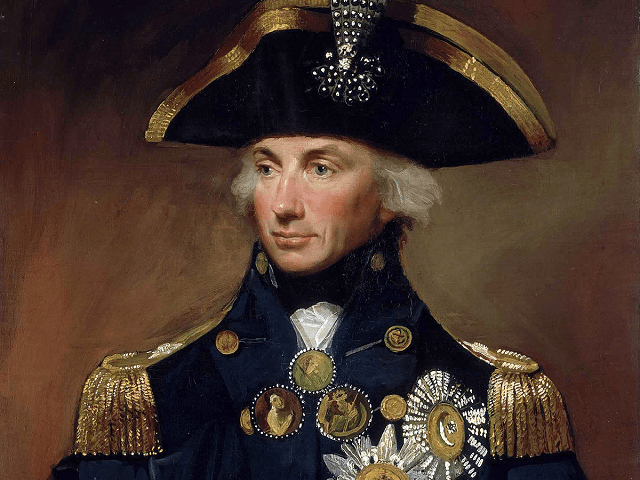British naval hero Horatio Nelson — later 1st Viscount Nelson — who defeated the French at the battle of Trafalgar was born on this day in 1758.
A brief biography of Lord Nelson from the National Museum of the Royal Navy relates that:
He joined the royal Navy as an ordinary seaman at 12 years old on HMS Raisonnable but was quickly promoted to midshipman and officer training and in his twenty first year he was posted captain. He is still regarded by most as Britain’s greatest naval hero.
In a 34 year career he fought in over 14 battles before his death in 1805 at Trafalgar. He was well known for his leadership skills, grasp of strategy, and unconventional tactics which brought about a number of decisive British naval victories and was exceptional even by the standards of his day.
His bold decisions usually involved taking offensive action against the enemy and often exposing his ship to heavy enemy fire.
He lost the sight of his eye at Corsica and an arm at Tenerife. With Jervis’s fleet at the Battle of Cape St Vincent in 1797, it was his audacious manoeuvre against the Spanish line that led to their defeat.
Against the French at the Battle of the Nile in 1798, his fleet was numerically inferior yet he decimated the enemy squadron.
During the attack on the anchored Danish Fleet at Copenhagen, again sailing through dangerous waters, he pounded the enemy into submission. On that occasion when signalled to withdraw, it is said that he raised his telescope to his blind eye and said, ‘I really do not see the signal’.
He inspired his men and taught his captains well. It was at Trafalagar in 1805, however, when he made his famous signal, ‘England expects that every man will do his duty’, that sealed his fame. In a brilliant tactical victory he won the battle but lost his life, struck down by a bullet from a sharpshooter in the rigging of the French Redoutable.
HMS Victory was his flagship and you can step onboard and experience what life was like at sea during the 1700s and 1800s at Portsmouth Historic Dockyard.
Hero-worship of the great man was widespread and considered perfectly normal in the United Kingdom until very recently, with Nelson’s valour and intelligence considered appropriate fodder for inspiring future generations of Britons to great deeds, or at least to honourable life.
Latterly, Lord Nelson — in common with other formerly uncontroversial heroes — has come under attack with the modern-era fascination for iconoclasm and revisionism.
Historic England — the government-funded body charged with preserving the nation’s built heritage — went wildly off the reservation in 2018 when it tweeted an image of a wrecking-ball demolishing the famous statue-topped Nelson’s Column in London’s Trafalgar Square. A statue of Lord Nelson was vandalised this year amid BLM-inspired attacks on public works of art across the UK, but the perpetrator was allowed to walk out of court with a conditional discharge, paying costs of just £22.
Trafalgar day, once widely celebrated to mark both Nelson’s greatest military achievement in defeating French tyranny at sea but also his death at the peak of the fighting on that day, was not marked in London last year because of Extinction Rebellion protests and will not again this year because of Coronavirus. In Birmingham, Britain’s second city, it hasn’t been marked since 2016.

COMMENTS
Please let us know if you're having issues with commenting.